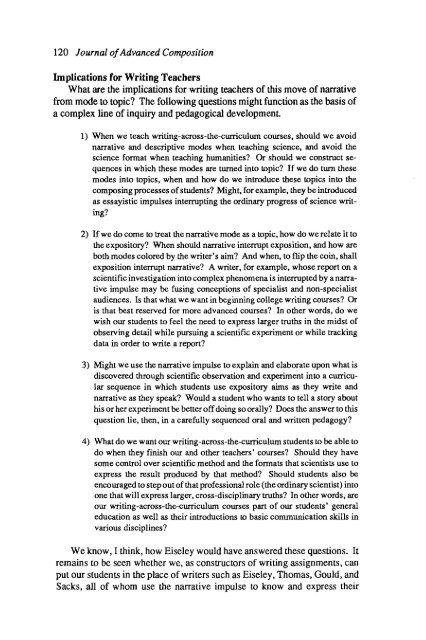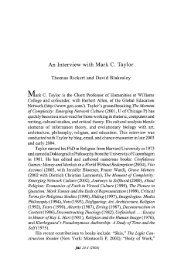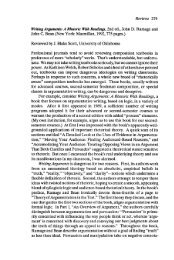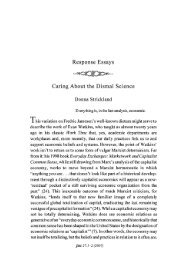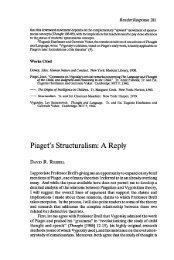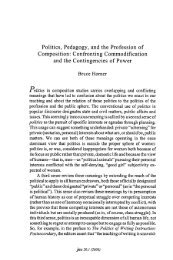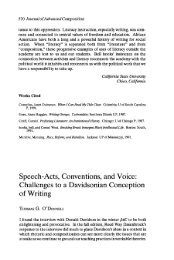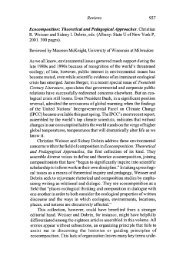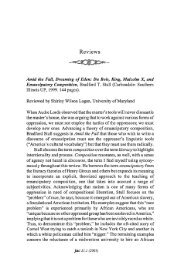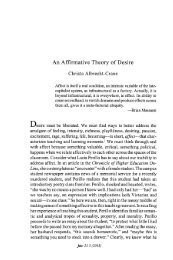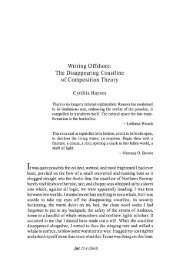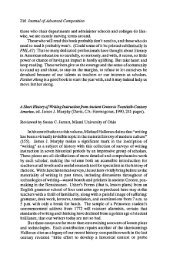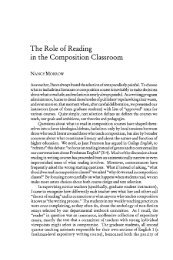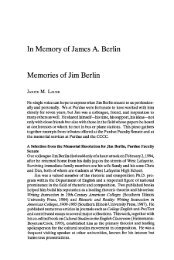Narrative Topic and the Contemporary Science Essay ... - JAC Online
Narrative Topic and the Contemporary Science Essay ... - JAC Online
Narrative Topic and the Contemporary Science Essay ... - JAC Online
Create successful ePaper yourself
Turn your PDF publications into a flip-book with our unique Google optimized e-Paper software.
120 Journal of Advanced Composition<br />
Implications for Writing Teachers<br />
What are <strong>the</strong> implications for writing teachers of this move of narrative<br />
from mode to topic? The following questions might function as <strong>the</strong> basis of<br />
a complex line of inquiry <strong>and</strong> pedagogical development.<br />
1) When we teach writing-across-<strong>the</strong>-curriculum courses, should we avoid<br />
narrative <strong>and</strong> descriptive modes when teaching science, <strong>and</strong> avoid <strong>the</strong><br />
science format when teaching humanities? Or should we construct sequences<br />
in which <strong>the</strong>se modes are turned into topic? If we do turn <strong>the</strong>se<br />
modes into topics, when <strong>and</strong> how do we introduce <strong>the</strong>se topics into <strong>the</strong><br />
composing processes of students? Might, for example, <strong>the</strong>y be introduced<br />
as essayistic impulses interrupting <strong>the</strong> ordinary progress of science writing?<br />
2) If we do come to treat <strong>the</strong> narrative mode as a topic, how do we relate it to<br />
<strong>the</strong> expository? When should narrative interrupt exposition, <strong>and</strong> how are<br />
both modes colored by <strong>the</strong> writer's aim? And when, to flip <strong>the</strong> coin, shall<br />
exposition interrupt narrative? A writer, for example, whose report on a<br />
scientific investigation into complex phenomena is interrupted by a narrative<br />
impulse may be fusing conceptions of specialist <strong>and</strong> non-specialist<br />
audiences. Is that what we want in beginning college writing courses? Or<br />
is that best reserved for more advanced courses? In o<strong>the</strong>r words, do we<br />
wish our students to feel <strong>the</strong> need to express larger truths in <strong>the</strong> midst of<br />
observing detail while pursuing a scientific experiment or while tracking<br />
data in order to write a report?<br />
3) Might we use <strong>the</strong> narrative impulse to explain <strong>and</strong> elaborate upon what is<br />
discovered through scientific observation <strong>and</strong> experiment into a curricular<br />
sequence in which students use expository aims as <strong>the</strong>y write <strong>and</strong><br />
narrative as <strong>the</strong>y speak? Would a student who wants to tell a story about<br />
his or her experiment be better off doing so orally? Does <strong>the</strong> answer to this<br />
question lie, <strong>the</strong>n, in a carefully sequenced oral <strong>and</strong> written pedagogy?<br />
4) What do we want our writing-across-<strong>the</strong>-curriculum students to be able to<br />
do when <strong>the</strong>y finish our <strong>and</strong> o<strong>the</strong>r teachers' courses? Should <strong>the</strong>y have<br />
some control over scientific method <strong>and</strong> <strong>the</strong> formats that scientists use to<br />
express <strong>the</strong> result produced by that method? Should students also be<br />
encouraged to step out of that professional role (<strong>the</strong> ordinary scientist) into<br />
one that will express larger, cross-disciplinary truths? In o<strong>the</strong>r words, are<br />
our writing-across-<strong>the</strong>-curriculum courses part of our students' general<br />
education as well as <strong>the</strong>ir introductions to basic communication skills in<br />
various disciplines?<br />
We know, I think, how Eiseley would have answered <strong>the</strong>se questions. It<br />
remains to be seen whe<strong>the</strong>r we, as constructors of writing assignments, can<br />
put our students in <strong>the</strong> place of writers such as Eiseley, Thomas, Gould, <strong>and</strong><br />
Sacks, all of whom use <strong>the</strong> narrative impulse to know <strong>and</strong> express <strong>the</strong>ir


